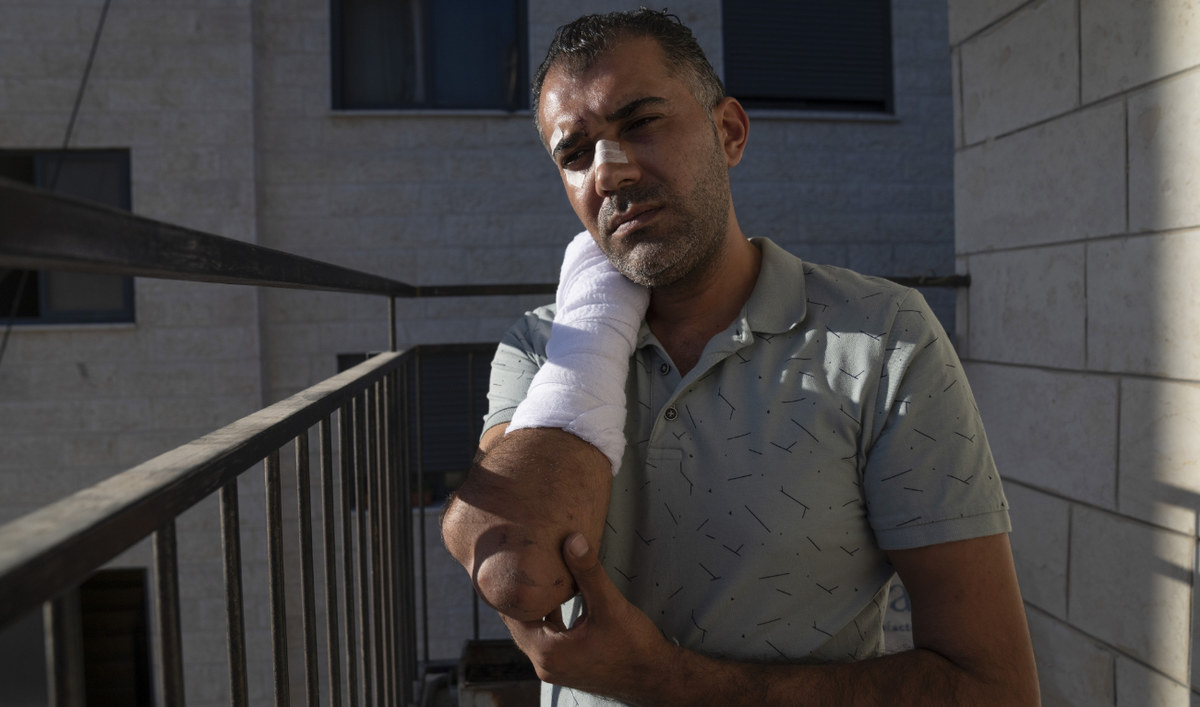RAMALLAH: As Yousef Adi strolled through the Old City of Jerusalem on his way to pray at Al-Aqsa Mosque, the last thought on his mind was that he would end up bloodied, beaten and unconscious in hospital.
But thanks to the actions of a rogue element of the Israeli security forces that critics say is increasingly out of control, that is exactly what happened.
Adi, 36, from Hebron, a technician at Palestine TV, was arrested by officers from the Israeli Border Police force. He was handcuffed, forced to the ground and beaten until he bled. The beating continued at a nearby police station, where Adi was tied to a chair and attacked until he lost consciousness. He woke up in hospital.
Adi told Arab News: “A Border Police force officer stopped me and asked to check my identity card, then she asked me if I had an entry permit to Israel. After they checked and confirmed that I had a permit, she said she would conduct a body search.
“As I turned my face against the wall and raised my hands for the search, I asked: ‘Why do you want to search me? I am a journalist and hold a permit, and I came to pray at Al-Aqsa.
“The policewoman replied: ‘I am free to search you, and arrest you as well.’ Then she called other officers, who put me on the ground and handcuffed me, and started beating me. My nose was bleeding, and they put their knees on my neck, and I remembered George Floyd, and I felt I almost suffocated.”

Yousef Adi shows his injuries at his apartment in the West Bank city of Ramallah. (AP)
The violence continued for three hours at the police station, where Adi passed out. When he regained consciousness in hospital, he was taunted by a high-ranking officer from the Border Police, who said he had reprimanded his officers for not beating Adi more severely.
The following day, Adi was brought before an Israeli court, which released him on bail of $150 and banned him from entering Jerusalem for a month. “I asked to file a complaint against the officers who beat me, but no one listened to me,” he said.
Adi’s ordeal this month came as no surprise to activists who have been documenting excessive violence by the Border Police against Palestinians for more than 20 years. In a report in 2001, the Israeli group B’tselem recorded several cases of abuse over only a few months, including officers breaking the hand of a three-year-old child. B’tselem also accused the force of breaking the law by failing to display tags that allowed individual officers to be identified. Filing complaints against the Border Police is also deliberately blocked by bureaucratic obstacles.
The force operates in the occupied West Bank under the command of the Israeli military, but it is administered by the Ministry of Internal Security, which makes it difficult to take legal action against it.
Jessica Montell, executive director of the HaMoked rights group, told Arab News: “Police violence against Palestinians in East Jerusalem has become routine over the past few years, but violent police officers are rarely held accountable. Investigations into police brutality can drag on for years, and most complaints are closed with no measures taken against violent police officers.
“This creates a cycle that perpetuates police violence, as very few Palestinians are willing to file complaints because they have little faith in this system. Police officers can act with impunity.”
HaMoked has filed dozens of cases on behalf of Palestinian victims of Border Police violence, including a 60-year-old woman who was handcuffed and dragged across the floor of her home; a young man pulled out of bed in the middle of the night, falsely identified as someone else, and his family members beaten; and a 16-year-old stripped and beaten in a public washroom.
Despite the violence, the Border Police have their defenders. Samuel Katz, author of a book about the force, said they were placed in an impossible position. They had a dual mission of deterrence and de-escalation, while under public and political pressure to show unbreakable force. “They are damned if they do the right thing and damned if they don’t,” he told Arab News.
“They aren't tougher than any other gendarmerie force in the world that contends with civil disturbances. Just check out European police anti-riot units, including those in Holland, Belgium, and especially France, the Israelis are tame by comparison.”
Palestinian leaders reject that analysis. Ahmed Ghuneim, of the Fatah movement in East Jerusalem, said the conduct of the Border Police, who “behave like Rambo characters,” was largely responsible for the cycle of violence in Jerusalem and the occupied West Bank.
He told Arab News: “The experience of the Palestinians is that the state of Israel has not condemned any soldier who assaulted Palestinians, even if he causes them to be killed. So to whom do we complain, and why would we bother?
“The young man who sees his brother, father, mother or sister being violently beaten by the Border Police will undoubtedly think of revenge.”



































